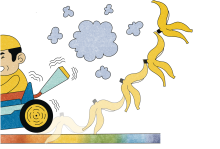Psalms

WE HAVE SEVERAL readings this month where God creates something out of nothing — or at least out of pretty limited materials. In the opening chapters of Genesis, we see creation birthed from God’s imagination and curiosity. In the story of Sarah and Abraham, a child is conceived in a womb so postmenopausal that the now-pregnant woman can’t help but laugh (Genesis 18). A well appears from nowhere to quench the thirst of a dying woman and her child (Genesis 21:19). God “calls into existence the things that do not exist” (Romans 4:17). And God turns death to life through the mysteries of resurrection (Romans 6:1-11).
This month’s lectionary readings make God’s continuous creation — as well as God’s continual renewal of creation — explicit. But the fact is, once we’re looking for it, all of scripture tells these stories of renewal. God is always creating, re-creating, and reimagining our world. God is always making a way where there was no way before. God continually turns death to life. And, just as importantly, we are called to participate in God’s divine practices of continuous creation, in God’s own divine practice of everyday resurrection.
As we exit a series of some of the higher holy seasons in the liturgical year — Epiphany, Lent, Easter, and Pentecost — June quiets down from such intensity. The slower pace to which (in some places) the warm summer sun calls us can inspire us to seek out everyday resurrection wherever God hides it. How is the Spirit calling you to partner with divine practices of renewal, with everyday resurrections?

IN HER RECENT article “Praying the Imprecatory Psalms Is an Act of Nonviolence,” Liz Cooledge Jenkins explains that the imprecatory psalms of the Hebrew Bible “demand that God exact judgment against evildoers.” These psalms are particularly ... colorful. Take Psalm 35, for example:
Let ruin come on them unawares.
And let the net that they hid ensnare them;
let them fall in it—to their ruin.
In comparison to other imprecatory psalms, the above is fairly sanitized. Often in these verses, the psalmist calls for teeth-breaking, infant murder, and widow-making. To be honest, I’ve struggled to read them. My privileged life has left me with few enemies worth cursing and scant violence to avenge. But I realize that many people of faith—especially those living under oppression’s boot—may find a certain catharsis in these psalms as they imagine God judging the truly hurtful people and powers of the world. “In praying these psalms,” writes Cooledge Jenkins, “we process our rage and give our violent impulses over to God.” One problem, though: The curses in the imprecatory psalms are a bit dated and unrelatable. I’ve gone to the trouble of updating them for modernity. For your consideration:
Psalm 1
O Lord, may the iPhone of the slumlord in Crown Heights fall into a toilet of his own urine. May a single AirPod follow quickly behind.

As Hebrew Bible scholar Walter Brueggemann has reflected, the imprecatory psalms put words to our thirst for vengeance. In praying these psalms, we process our rage and give our violent impulses over to God. “O God, break the teeth in their mouths,” one psalmist prays; “let them be like the snail that dissolves into slime” (Psalm 58:6, 8). I’m all for this kind of prayer. I’m all for praying the entire range of the psalms — even the ones that sometimes make us uncomfortable or aren’t necessarily welcome in church. And if there is any occasion for an imprecatory psalm, certainly Russia’s invasion of Ukraine, in all of its brutality and sheer horror, is one of those occasions.

Psalm 46 calls us to quiet our souls. But it also guides us to engage a tumultuous world.

AT THIS POINT, it’s almost a tradition that aging roots music icons find a third, fourth, or fifth act in partnership with some latter-day guru of cool. Think Rick Rubin and Johnny Cash, Jack White and Loretta Lynn, Joe Henry and almost everyone else.
But the latest such pairing is, on the surface at least, the most incongruous yet. Jessi Colter, a soulful country singer most famous for being the widow of Waylon Jennings, has made an album (The Psalms) with Lenny Kaye, the rock historian, producer, and guitarist most famous for his lifetime membership in the Patti Smith Group.
Unlike all those other musical odd couplings, this one is not cross-generational. Colter is only three years older than Kaye, but it was always a long way from CBGB to the Grand Ole Opry. Yet here they are collaborating, on an album of Bible verses set to music no less. But when you look a little bit below the surface, this pairing makes all the sense in the world.
The origins of this album go all the way back to 1995, when Kaye, who has always kept up his career as a music journalist, was in Nashville helping Waylon Jennings write his autobiography. One morning, he walked into the living room and beheld Colter at the piano, her Bible open before her, laying down chords and improvising melodies as she sang from the King James Version of the Psalms. It was, Kaye has written, “one of the most beautiful expressions of belief I had ever witnessed.”

"Why do we need art, why do we need the lyric poetry of the Psalms?" asks Bono in a new short documentary with Fuller Studio.
"Because the only way we can approach God is if we're honest."

The poetic prayers, songs, and laments of the book of Psalms were recorded to teach worshipers how to praise God, as well as to lament and grieve. When undergoing times of agony or when words are not enough, the Psalms can express the painful emotions for us, as processing emotion helps us to move forward with difficult choices.
Much of the Psalms were attributed to David, including the prayer of Psalm 55—a lament about suffering violence at the hands of a loved one. Many victims of abuse find themselves alone and abandoned by family and friends who become impatient and exasperated by their ongoing struggle with loving their abuser. Praying through a Psalm may be an emotional refuge during such a painful time.

Two weeks ago in Soma, Turkey, a coal mine explosion left 301 people dead. It was the country’s worst mining disaster, but it wasn’t the first — and it wasn’t the last, as multiple fatal accidents have happened in the two weeks since. The last time a mining disaster caught the world’s attention, we watched and waited and prayed during the rescue operation for the miners in Chile.
In Turkey, people protested in the streets of Soma — protested against Soma Mining for letting this happen, against their government for loopholes in safety rules. In response, the police issued a ban on protests and locked the city down. The ruling political party proudly announces that it has inspected that mine 11 times in the past 5 years; Soma Mining denies negligence. And the families of 301 persons mourn their losses.
This isn’t a faraway problem. In the United States, we don’t do as much traditional mining as we used to — instead, we do mountaintop removal. This has a human cost, too, in more insidious ways. The people living in Appalachia have higher rates of respiratory illness, cancer, kidney diseases, skin ailments, and more. And the landscape, which has the fingerprints of God in it, is being blown apart.
Psalm 95:4-5 says:
“In [God’s] hand are the depths of the earth; the heights of the mountains are [God’s] also. The sea is [God’s], for [God] made it, and the dry land, which [God’s] hands have formed.”

I had the idea for this blog post a couple weeks ago, but I thought it best to wait until around this time to release it. Just two weeks into the new year, this is usually the stage in which people are slowly becoming less committed to their resolutions.
I know there is much disdain for the phrase "new year, new me." We all have family and friends who commit themselves to something on January 1st, whether it be to exercise more, eat healthier, become a better Christian, etc., and just days into the new year they have already failed to live out those commitments. The phrase probably should be "new year, same old me." This post is not intended to stroke the ego of our skeptics, rather, Lord willing, it will serve as encouragement to those who strive to better themselves.
Although we struggle to stay faithful to our new found endeavors, thankfully we serve a God who is both patient and forgiving. Psalm 86:15 states, "But you, O Lord, are a God merciful and gracious, slow to anger and abounding in steadfast love and faithfulness."

After learning about Jesse Lewis, a six-year-old who died in the Sandy Hook shooting a year ago this Dec. 14th, I’m thinking about scratching out the name Jacob in Psalm 146 and writing in Jesse.
Psalm 146, verse 5 says, “Happy are those whose help is the God of Jacob, whose hope is in the LORD their God.” I’m wondering if scratching out Jacob and writing in Jesse, at least in these upcoming weeks, might be a way of praying to transform anger and resentment into love and forgiveness.
Jesse was a pretty amazing six-year old who loved adventures, mud, a golden yellow bear, and his big brother. His mom says he was “full of courage and strength,” so much so, that in the midst of the unfolding tragedy Jesse stood still and told his classmates to “Run!” In so doing, he lost his life.
Scarlett Lewis, Jesse’s mom, returned home after the unthinkable tragedy only to find something wonderful Jesse had scratched onto the kitchen chalkboard: "Norturing, helin, love." His mom knew immediately these were Jesse’s last words to her: Nurturing, healing, love. In her book, Nurturing Healing Love: A Mother’s Journey of Hope & Forgiveness, Scarlett tells the story of her journey to forgiveness and hope as a legacy beyond anger and resentment. She begins, of course, with Jesse’s story.

He’s best known for his iconic 1980s feel-good hit “Don’t Worry, Be Happy,” but Grammy-award winning artist Bobby McFerrin explores a deeper side of life in a new album.
Titled spirityouall, the recording includes his adaptations of traditional African-American spirituals and devotional songs that he composed.
McFerrin believes music has a transcendent spiritual power.

“O Lord, our Sovereign, how majestic is your name in all the earth! You have set your glory above the heavens.” And from those heavens descended a deadly cloud.
“Out of the mouths of babes and infants ...” The children of Plaza Towers Elementary?
“What are human beings that you are mindful of them, mortals that you care for them?” Indeed that is the question that troubles the heart of the faithful in times like these.
Can we still praise God? If so, how do we start? Can we possibly understand what happened in Moore, Okla.?
Don’t trust anyone who claims to comprehend the meaning of this storm. Don’t trust anyone who points with absolute certainty to a single cause for this storm. Don’t trust anyone who treats a tornado as anything but indiscriminate and cruel. These tragedies are not punishments or object lessons. Such natural forces do not reach their conclusion with a pat moral or a simple “they lived happily ever after.”

I’m going to tell you something I do not do very well. But, only if you will not tell the other mothers because I have listened to them talk, and apparently I am the only one not very good at this. Deal?
I'm not good at helping my children learn to feed themselves. I totally get in the way. Let me explain.
Well, actually, there isn’t much about it to explain.
I don't like messes. So, I feed my children … for too long. I sit a bowl full of spaghetti in front of them, and I get a little panicky. I mean, have you ever found dried, crusted spaghetti noodles on the floor a week (or more) later when you're cleaning? And what about the slimy, greasy residue left on the plastic tray attached to the high chair? And then there's the highchair cover. I did not realize you could take that thing off to clean it until my second child was two. Wow. That was amazing — what I found under it, I mean.
Never mind the fact that most of the food gets on the child and everything and everyone else … not in their mouths.
And, I mean, I'm also very concerned about my child’s dietary needs. Seriously, I think that is the biggest reason I insist on feeding them well into their third year. (Did I just write that?) They need me. They need me to spoon that mouthful of spaghetti straight into their teeny little mouth. That way I know where it goes — there is no guesswork.

On Sept. 5, 1997, the world mourned when Mother Teresa, whose work with the poorest of the poor made her a global icon, died of a heart ailment at age 87.
Exactly 10 years later, the world did a double take, when a volume of Teresa's private letters revealed that the tireless, smiling nun spent the last 39 years of her life in internal agony. Jesus, she wrote, no longer seemed present to her, in prayer or even in the Eucharist. In letter after tormented letter she described an unrelenting spiritual "dryness,” a "torturing pain." Her smile was "a big cloak" of deception. She admitted at one point to doubting God's existence. Eventually she apparently became more reconciled to her condition; but as far as we know, she died with it.

In the bright light of these days’ events it is helpful to be reminded of unalterable truths that transcend party conventions and oppressive governments. The political gatherings and increasing pain of the Middle East conflicts confuse the consciousness. They divert attention and trouble our slumber. Corporate callousness and individual hopelessness has set in and we have turned our faces to that which inures us from the persistent discomforting news.
Pick your own, even if momentary distraction. For me it has been Washington National’s baseball in the drive for a championship and maybe a World Series appearance. My spirit rises or falls on the team’s performances and batting averages of the Nats mini gods.
The biblical Job sought less superficial solace from his and the world’s sufferings. He responded to one of his “comforters” saying “when the land falls into the hand of the wicked He (God) blindfolds its judges” (9:24).

Two years ago during my step-daughter’s final months with terminal cancer, I spent three days in quiet reflecton at Saint John’s Abbey in Collegeville, MN. Worshiping with the Benedictines was part of the structure of my day, the chants and readings opening space for fresh air to enter my angry soul … except for … the Psalms. Outrageously violent, vindictive, intolerant, self-righteous—horrible expressions of emotions I had gone there to revoke.

I know that the sun will rise tomorrow.
With all of the scientific facts and astronomical data we are blessed with today, I can expect to wake up tomorrow and see rays of light shining through my window.
There is also no debating time. Our clocks, both digital and internal, continue to tick onward no matter the circumstances. These are inexorable certainties in life. However, these proven facts of our existence are limited. They are not the whole story.
There are things in life we neither can physically see nor explain, and yet we choose to believe anyway.
When our little siblings place their fallen teeth underneath their pillows, hoping to see a winged fairy deliver gifts in return, they are relying entirely on an unproven belief. When students choose universities to attend, they do not know what the outcomes of their decisions will be, nor can they predetermine their futures after school. But they continue to grow and experiment with life anyway.
Even the wisest of theologians and clergy have very few answers to the questions pertaining to God’s existence that enter our minds on a daily basis. All of these situations represent something many of us hold onto so dearly: Faith.

For decades, Psalm 139 has been a byword of the anti-abortion movement, printed on posters in crisis pregnancy centers. More recently, it's been tied to high-resolution ultrasounds, the movement's most potent technological persuader.
At the same time, the famous Psalm has also "come out" as a source of strength for gay and lesbian Christians.
Together, the two uses illustrate how great verses -- particularly the Psalms -- attract diverse constituencies.
Yesterday afternoon I found out that ABC news plans to dedicate it programming today to "Hunger at Home: Crisis in America." It precipitated my writing of this post which I had planned to add as a later addition to a series on tools for prayer.
One important item in our prayer toolkit is knowledge of our hurting world. Not knowledge for the sake of knowledge, but knowledge that equips us to respond. Becoming aware of the needs in our world can lead us into a deeper understanding of the ache in God's heart for our hurting friends and neighbors. It can also connect us to our own self-centered indifference that often makes us complacent when God wants us to be involved. And it can stimulate us to respond to situations that we once felt indifferent to.